Key takeaways:
- Intentionality in rehearsals enhances understanding and emotional depth.
- Setting clear and specific rehearsal goals fosters focused practice and unexpected discoveries.
- Collaboration and feedback among peers can significantly elevate performances and strengthen connections.
- Regular evaluation, including journaling and discussions, promotes growth and improves future rehearsals.
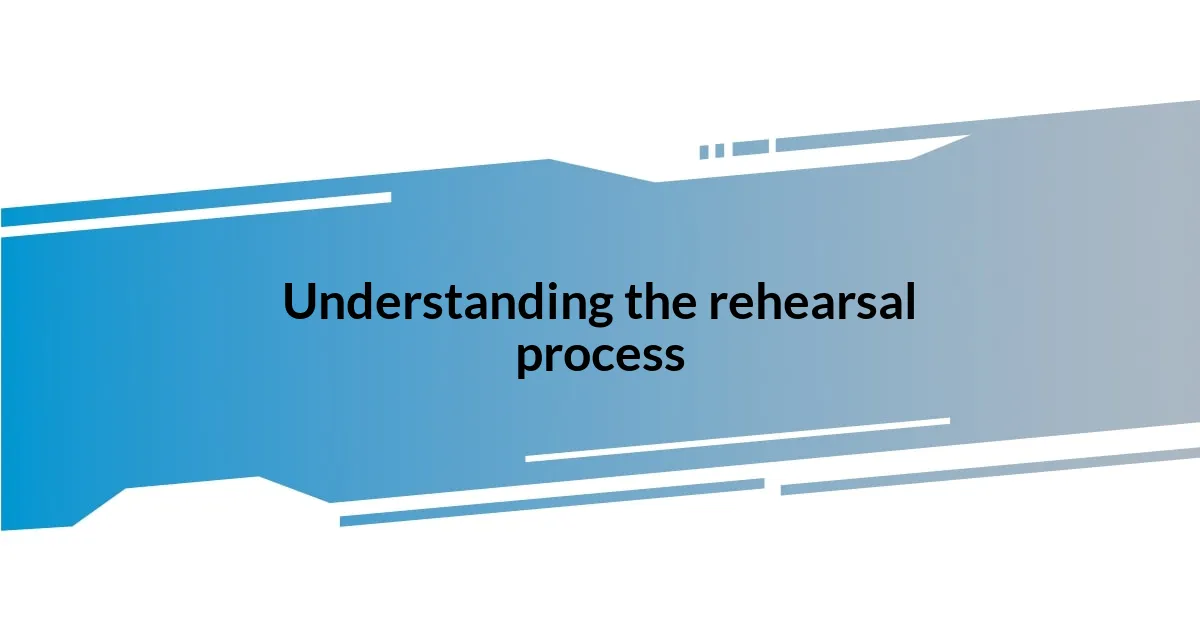
Understanding the rehearsal process
Understanding the rehearsal process is pivotal for anyone looking to truly master their craft. For me, rehearsing isn’t just about repeating words; it’s about immersing myself in the character’s emotions and motivations. Have you ever felt the exhilaration that comes from fully embodying a role? It’s a thrilling transformation that I chase each time I step into the rehearsal room.
One aspect that often gets overlooked is the importance of intentionality during rehearsal. I remember a time when I rushed through my lines, thinking speed equated to progress. However, I quickly realized that it was the moments of exploration—pausing to experiment with tone and gesture—that truly deepened my understanding. Have you found yourself in a similar situation, where slowing down revealed layers you hadn’t noticed before?
The rehearsal process also offers a unique space for collaboration and feedback. I cherish the moments of sharing ideas with my fellow actors, where discussions lead to fresh interpretations. This communal energy can spark creativity in ways I never anticipated—like when a colleague suggested a playful twist on a scene that turned it into one of my favorites. How crucial do you think collaboration is in refining your performance? For me, it’s an integral part of the journey.
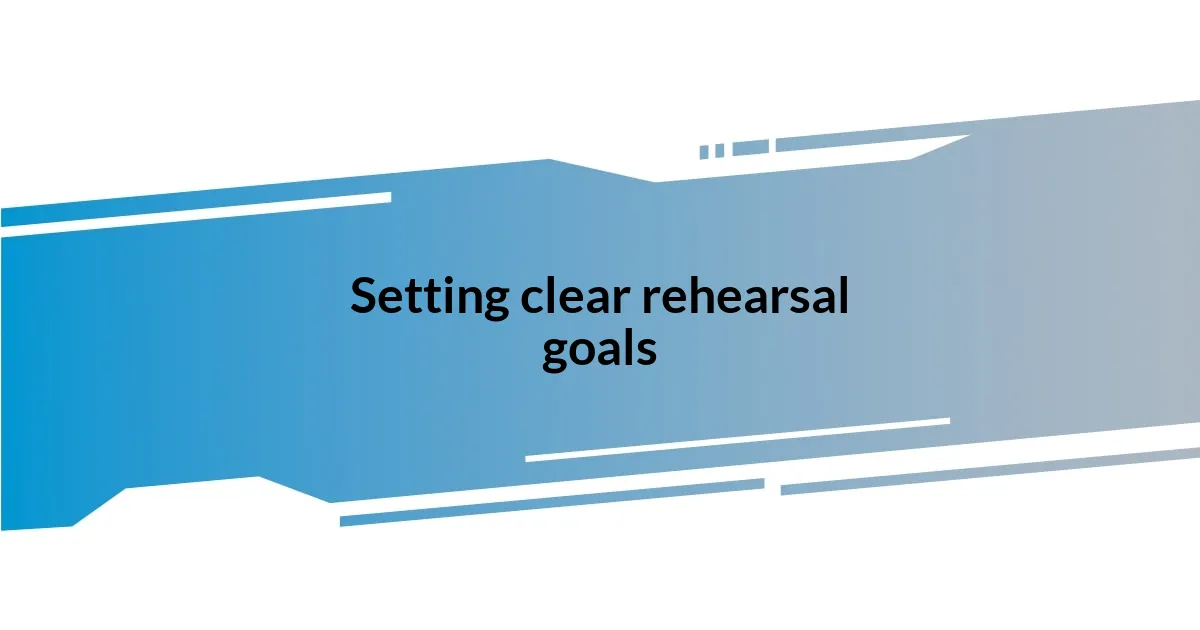
Setting clear rehearsal goals
Setting clear rehearsal goals is essential in steering the rehearsal process toward meaningful outcomes. By defining what I want to achieve in each session, I can focus my energy on specific elements that need attention. For instance, when I set a goal to explore a character’s vulnerability, I often find that it leads to more profound emotional connections during performances. Have you ever noticed how a clear intention can transform your approach?
It’s interesting to reflect on how different rehearsal goals can lead to entirely different outcomes. One time, I aimed to master a challenging scene, but instead, I discovered an unexpected layer of humor that transformed the mood of the entire piece. This shift not only surprised me but also enriched my understanding of the character. I’ve learned that flexibility in my goals can often yield delightful surprises. What about you? Have you experienced a shift that enhanced your performance?
To further illustrate the impact of setting clear rehearsal goals, take a look at this comparison table. It highlights the differences between vague and specific goals in rehearsals.
| Goal Type | Description |
|---|---|
| Vague Goal | “Get better at my lines.” |
| Specific Goal | “Master the emotional transitions in Act 2.” |
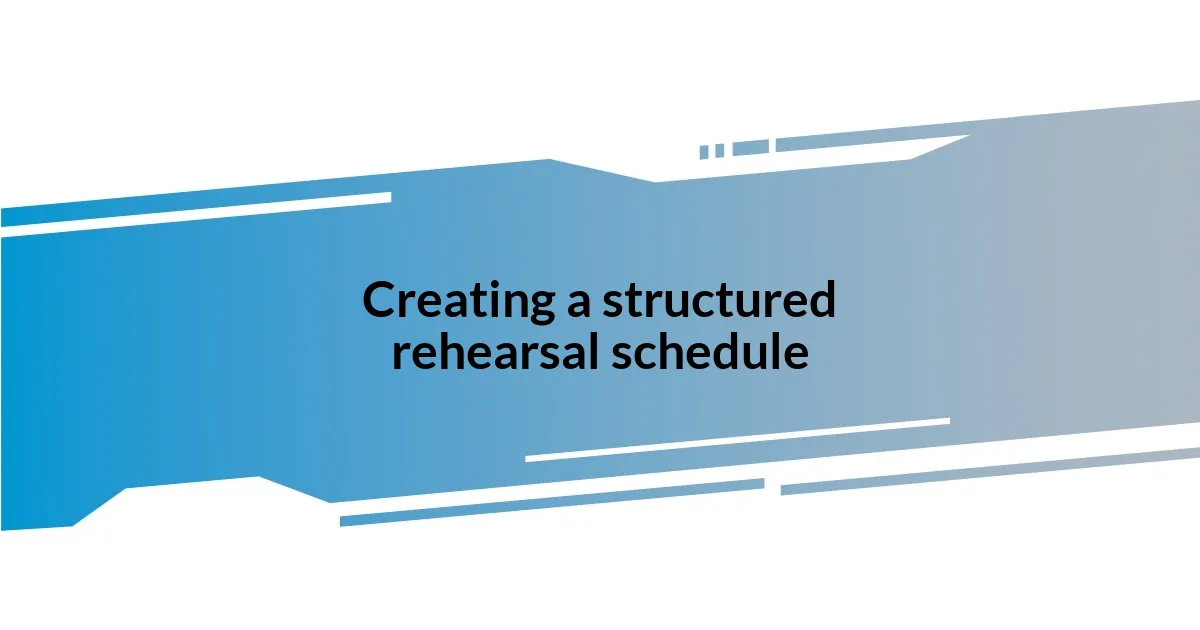
Creating a structured rehearsal schedule
Creating a structured rehearsal schedule is like building a reliable roadmap for your artistic journey. I remember an experience where I found myself adrift in rehearsals without a plan. By introducing a schedule, I quickly saw the benefits—it transformed my chaotic routine into a focused practice. Each session became a stepping stone, leading me closer to my performance goals.
To create an effective rehearsal schedule, consider these elements:
- Time Allocation: Dedicate specific blocks for different aspects of rehearsal—lines, blocking, character work.
- Regularity: Set consistent days and times to keep your momentum strong and ensure no detail gets neglected.
- Flexibility: Allow room for adjustments; sometimes, unplanned explorations can lead to valuable insights.
- Checkpoints: Schedule review sessions to reflect on your progress, ensuring that you’re meeting your goals.
With this structured approach, each rehearsal feels purposeful, contributing to a deeper connection with the material. Wouldn’t you agree that organization fosters creativity more effectively than chaos?
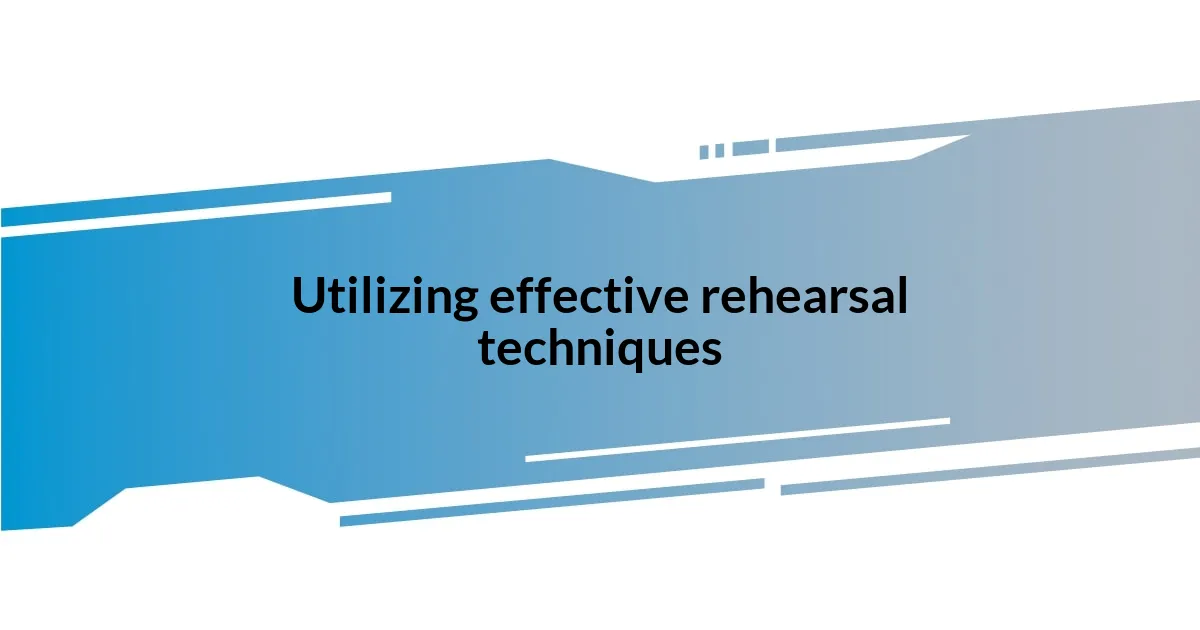
Utilizing effective rehearsal techniques
While working on rehearsal techniques, I’ve found that incorporating varied rehearsal methods can significantly enhance my learning process. For instance, I often switch between different styles, like improvisation and scripted practice. This keeps things fresh and allows me to uncover new interpretations of a role. Have you ever tried an approach that seemed unconventional but worked wonders?
Visualization is another powerful tool I’ve embraced during rehearsals. Before stepping on stage, I spend a few minutes picturing scenes in my mind, imagining not just the actions but the emotional beats as well. This practice helps me connect deeply with the character’s journey, allowing me to embody them more authentically. Can you recall a moment when visualization helped you perform better?
Lastly, collaboration during rehearsal has been a game-changer for me. I remember a time when I invited a fellow actor to run lines together in a casual setting—this relaxed environment sparked creativity and opened up new dialogue ideas. Working together has not only strengthened our performances but has also fostered a sense of camaraderie. Have you ever experienced the magic that comes from a collaborative rehearsal?
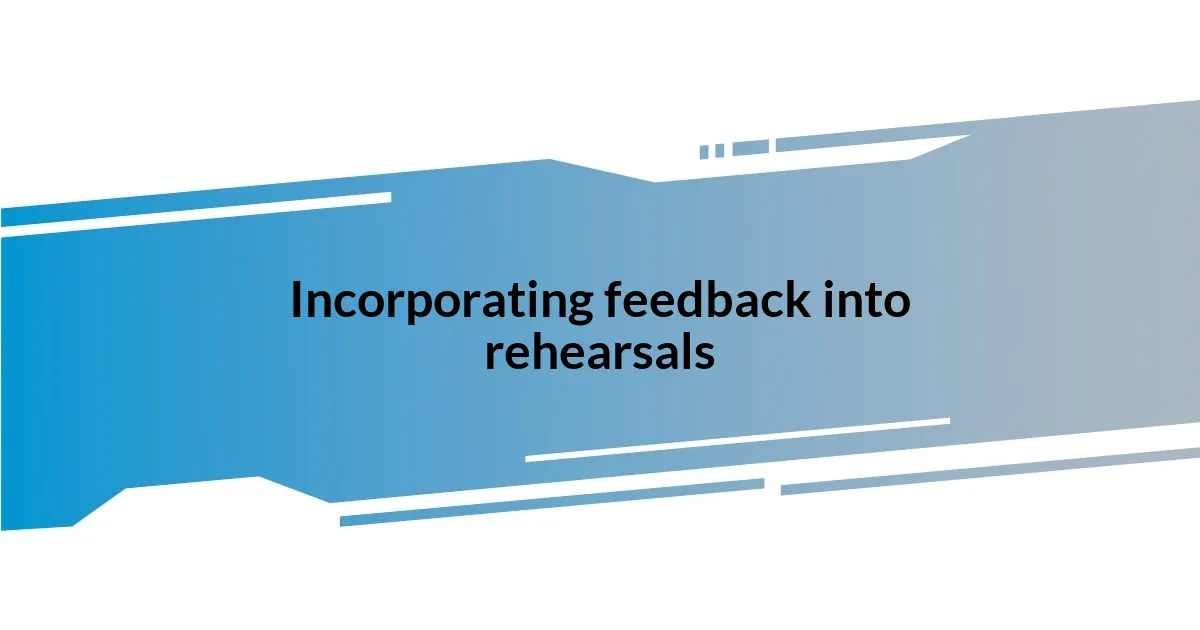
Incorporating feedback into rehearsals
Incorporating feedback during rehearsals has been one of the most transformative aspects of my process. I vividly recall a rehearsal where my director provided constructive criticism about my pacing. At first, I felt defensive, but I took a moment to reflect on it. When I applied her suggestions, I noticed an immediate improvement—it’s amazing how just a few tweaks can elevate a performance.
During each rehearsal, I actively invite feedback from castmates, too. Once, a fellow actor pointed out a subtle emotional shift that I had missed. It wasn’t a painful critique; instead, it felt like a gift. That moment taught me how open dialogue with peers can create a safer space for growth and exploration. Have you ever felt an unexpected surge of creativity after receiving a simple piece of advice?
I’ve learned that setting aside time for feedback discussions at the end of each rehearsal can be incredibly fruitful. It’s not just about identifying what went wrong, but also celebrating what went well. I remember wrapping up a session and asking my group for their insights; the outpouring of appreciation and constructive comments bonded us, reinforcing my belief in collaborative growth. How do you integrate feedback into your routine? Are you making the most of those insights?
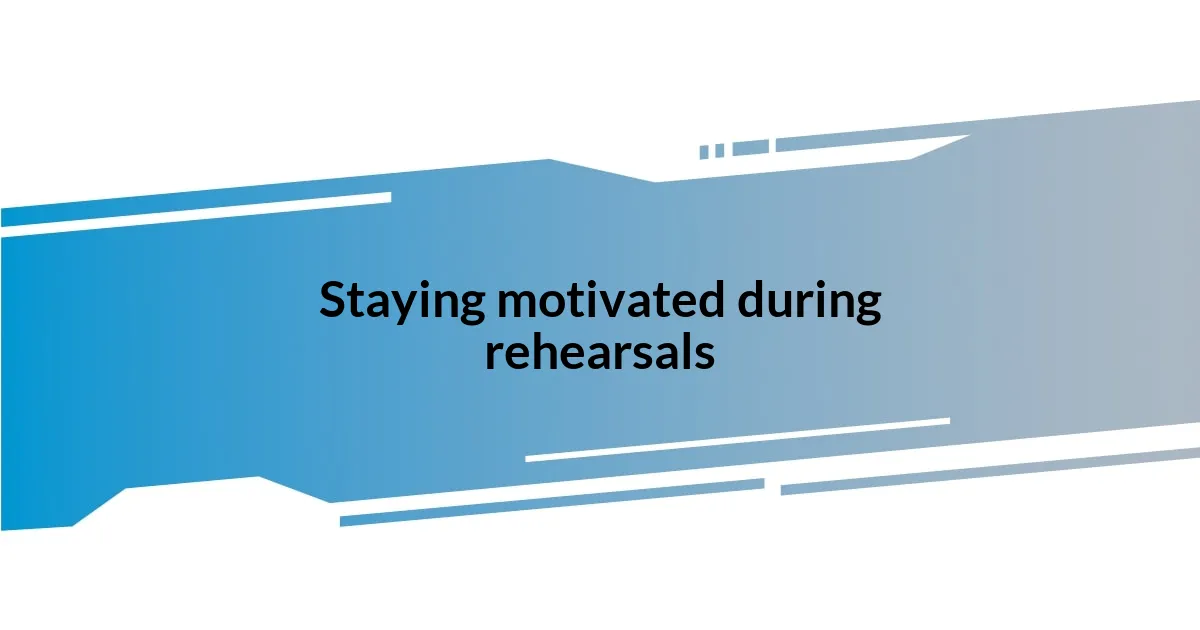
Staying motivated during rehearsals
Staying motivated during rehearsals can sometimes be a challenge, but I’ve discovered a few strategies that work wonders for me. One technique I often use is setting small, achievable goals for each session. For example, I might aim to nail a particularly challenging scene or perfect a specific line delivery. Celebrating those little victories not only boosts my confidence but also keeps the energy flowing. Have you ever tracked your progress like that?
Another vital element is maintaining a positive mindset throughout. I recall a particularly grueling rehearsal where fatigue was setting in, and I felt my enthusiasm waning. Instead of allowing that to derail my focus, I reminded myself why I love acting: the joy of storytelling. By taking a moment to reconnect with that passion, I found my motivation renewed, and the atmosphere shifted from dull to dynamic. How do you reignite your passion during tough rehearsals?
Lastly, surrounding myself with supportive colleagues plays a crucial role in staying motivated. I’ve been fortunate to work with teammates who uplift each other. I think back to a rehearsal where we all shared our favorite moments from past performances. Laughter and nostalgia flooded the room, creating a powerful bond that fueled our current work. Isn’t it incredible how shared experiences can transform motivation into something contagious?
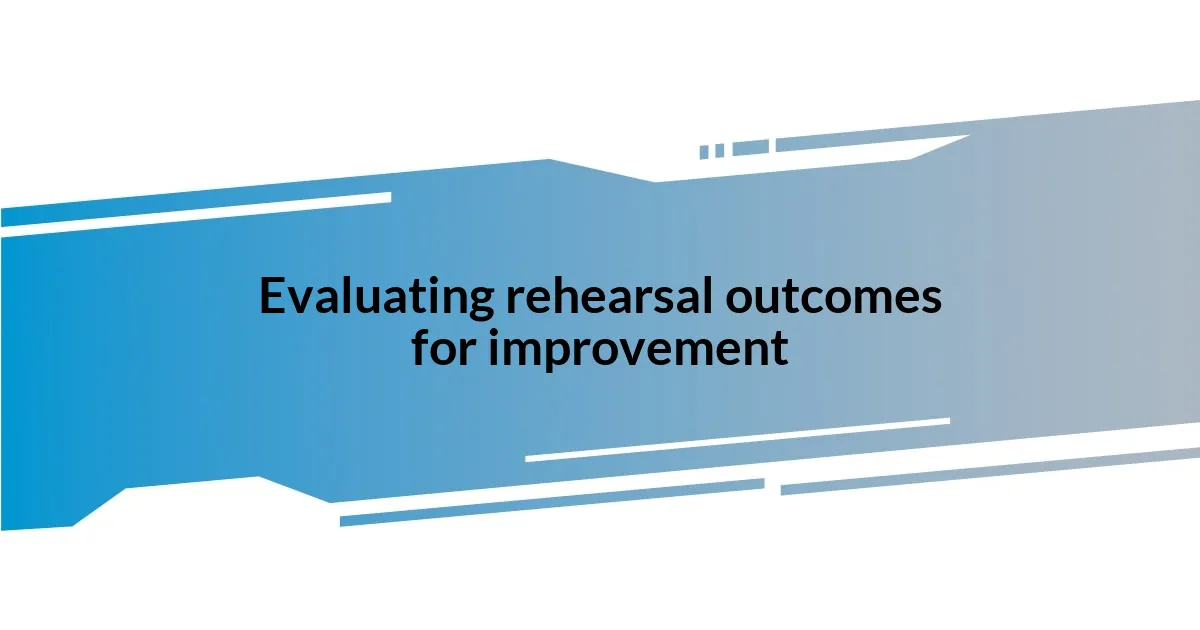
Evaluating rehearsal outcomes for improvement
Evaluating the outcomes of each rehearsal is a crucial part of my growth as a performer. After every session, I take a moment to reflect on what felt right and what didn’t. I remember a time when I struggled with a particular scene; initially, I thought I had nailed it, but watching the rehearsal playback revealed a lack of emotional depth. What I learned from that was invaluable—sometimes, the eye in the mirror reveals more than the heart in the moment.
I find keeping a rehearsal journal immensely helpful for evaluating outcomes. It allows me to jot down specific moments that resonated emotionally, along with feedback I’ve received from peers. On one occasion, I noted how a prop change impacted my performance. The next day, I integrated that learning into my preparation, which made a world of difference! Have you ever thought about how a small change in your routine might unlock new levels of performance?
In my experience, discussing results with my team enhances the evaluation process. We often hold post-rehearsal conversations where we share insights and reflect on our collective journey. I vividly recall a conversation after a long rehearsal when a teammate expressed how my energy uplifted the group, sparking a ripple effect. Moments like these remind me that evaluation isn’t just about the individual; it’s about how we impact each other. Isn’t it fascinating how our performances are intertwined?